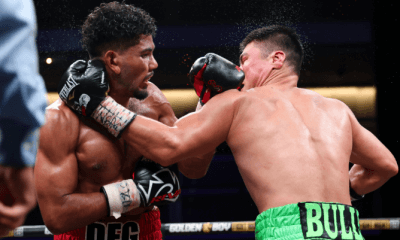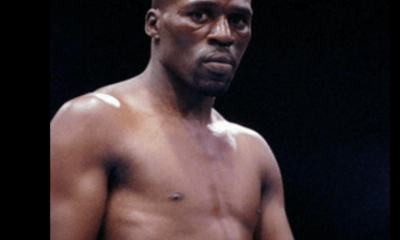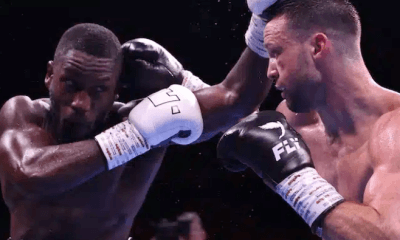Featured Articles
A Paean to the Great Sportswriter Jimmy Cannon Who Passed Away 50 Years Ago This Week
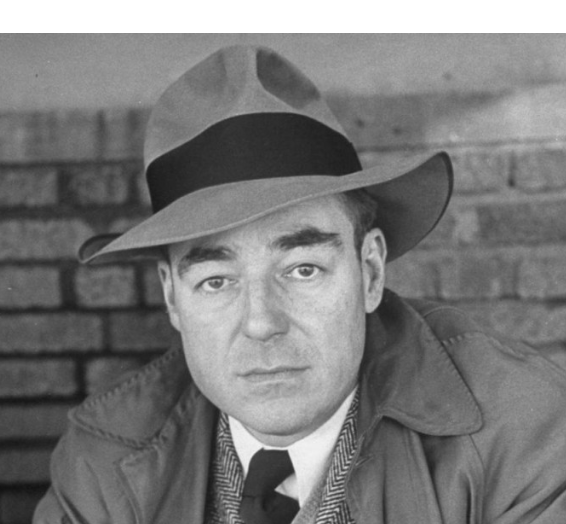
“Of all his assignments,” said the renowned sportswriter Dave Anderson, “[Jimmy] Cannon appeared to enjoy boxing the most.”
Cannon would have sheepishly concurred. He dated his infatuation with boxing to 1919 when he stood outside a saloon listening to a man with a megaphone relay bulletins from the Dempsey-Willard fight in faraway Toledo. His father followed boxing as did all the Irishmen in his neighborhood. For him, an interest in the sport of boxing, he once wrote, was like a family heirloom. But it became a love-hate relationship. It was Jimmy Cannon, after all, who coined the phrase “boxing is the red light district of sports.”
This week marks the 50th anniversary of Jimmy Cannon’s death. He passed away at age 63 on Dec. 5, 1973, in his room at the residential hotel in mid-Manhattan where he made his home. In the realm of American sportswriters, there has never been a voice quite like him. He was “the hardest-boiled of the hard-drinking, hard-boiled school of sports writing,” wrote Darrell Simmons of the Atlanta Journal. One finds a glint of this in his summary of Sonny Liston’s first-round demolition of Albert Westphal in 1961: “Sonny Liston hit Albert Westphal like he was a cop.”
In his best columns, Jimmy Cannon was less a sportswriter than an urban poet. Here’s what he wrote about Archie Moore in 1955 after Moore trounced Bobo Olson to set up a match with Rocky Marciano: “Someone should write a song about Archie Moore who in the Polo Grounds knocked out Bobo Olson in three rounds…It should be a song that comes out of the backrooms of sloughed saloons on night-drowned streets in morning-worried parts of bad towns. The guy who writes this one must be a piano player who can be dignified when he picks a quarter out of the marsh of a sawdust floor.”
Prior to fighting in Madison Square Garden the previous year – his first appearance in that iconic boxing arena – Moore had roamed the globe in search of fights in a career that began in the Great Depression. Cannon was partial to boxers like Archie Moore, great ring artisans who toiled in obscurity, fighting for small purses –“moving-around money” in Cannon’s words — until the establishment could no longer ignore them.
Jimmy Cannon was born in Lower Manhattan. He left high school after one year to become a copy boy for the New York Daily News. In 1936, at age 26, the News sent him to cover the biggest news story of the day, the Lindbergh Baby kidnapping trial. While there he met Damon Runyon who would become a lifelong friend. At Runyon’s suggestion, he applied for a job as a sportswriter at the New York American, a Hearst paper, and was hired.
During World War II, he was a war correspondent in Europe embedded in Gen. George S. Patton’s Third Army. When he returned from the war, he joined the New York Post and then, in 1959, the Journal-American which made him America’s highest-paid sportswriter at a purported salary of $1000 a week. His articles were syndicated and appeared in dozens of papers.
Cannon was very close to Joe Louis. He was the only reporter that Louis allowed in his hotel room on the morning of the Brown Bomber’s rematch with Max Schmeling. Louis, he wrote, “was a credit to his race, the human race.” It was his most-frequently-quoted line.
In an early story, Cannon named Sam Langford the best pound-for-pound fighter of all time. Later he joined with his colleagues on Press Row in naming Sugar Ray Robinson the greatest of the greats. As for the fellow who anointed himself “The Greatest,” Muhammad Ali, Cannon profoundly disliked him. He persisted in calling him Cassius Clay long after Ali had adopted his Muslim name.
It troubled Cannon that Ali was afforded an opportunity to fight for the title after only 19 pro fights. Ali’s poetry, he thought, was infantile. He abhorred Ali’s political views. And, truth be told, he didn’t like Ali because certain segments of society adored him. Cannon didn’t like non-conformists – hippies and anti-war protesters and such. When queried about his boyhood in Greenwich Village, he was quick to note that he lived there “when it was a decent neighborhood, before it became freaky.”
Cannon’s animus toward Ali spilled over into his opinion of Ali’s foil, the bombastic sportscaster Howard Cosell. “If Howard Cosell were a sport,” he wrote,” it would be roller derby.”
Cannon frequently filled his column with a series of one-liners published under the heading “Nobody Asked Me, But…” His wonderfully acerbic put-down of Cosell appeared in one of these columns. But one can’t read these columns today without cringing at some of his ruminations. He once wrote, “Any man is in trouble if he falls in love with a woman he can’t knock down with one punch.” If a newspaperman wrote those words today, he would be out of a job so fast it would make his head spin.
Similarly, his famous line about Joe Louis being a credit to the human race no longer resonates in the way that it once did. There is in its benevolence an air of racial prejudice.
Jimmy Cannon was a lifelong bachelor but in his younger days before he quit drinking cold turkey in 1948, he was quite the ladies man, often seen promenading showgirls around town. Like his pal Damon Runyon, he was a night owl. As the years passed, however, he became somewhat reclusive. The world passed him by when rock n’ roll came in, pushing aside the Tin Pan Alley crooners and torch singers that had kept him company at his favorite late-night haunts.
Cannon’s end days were tough. He suffered a stroke in 1971 as he was packing to go to the Kentucky Derby and spent most of his waking hours in his last two-plus years in a wheelchair. Fortunately, he could afford to hire a full-time attendant. In 2002, he was posthumously elected to the International Boxing Hall of Fame in the Observer category.
Jimmy Cannon once said that he resented it when someone told him that his stuff was too good to be in a newspaper. It was demeaning to newspapers and he never wanted to be anything but a newspaperman. He didn’t always bring his “A” game and some of his stuff wouldn’t hold up well, but the man could write like blazes and the sportswriting profession lost a giant when he drew his last breath.
To comment on this story in the Fight Forum CLICK HERE
—
Arne K. Lang is a recognized authority on the history of prizefighting and the history of American sports gambling. His latest book, titled Clash of the Little Giants: George Dixon, Terry McGovern, and the Culture of Boxing in America, 1890-1910, was released by McFarland in September, 2022.
-

 Featured Articles3 weeks ago
Featured Articles3 weeks agoThomas Hauser’s Literary Notes: Johnny Greaves Tells a Sad Tale
-
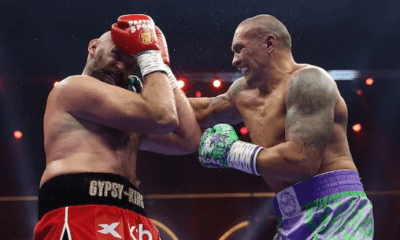
 Featured Articles2 weeks ago
Featured Articles2 weeks agoBoxing Notes and Nuggets from Thomas Hauser
-
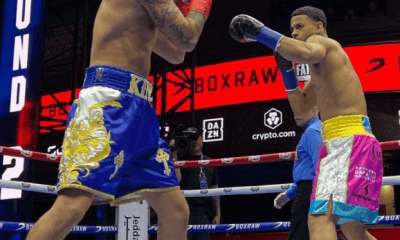
 Featured Articles4 weeks ago
Featured Articles4 weeks agoRolly Romero Upsets Ryan Garcia in the Finale of a Times Square Tripleheader
-
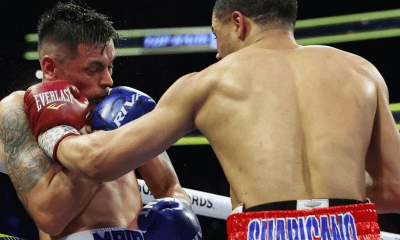
 Featured Articles4 weeks ago
Featured Articles4 weeks agoUndercard Results and Recaps from the Inoue-Cardenas Show in Las Vegas
-
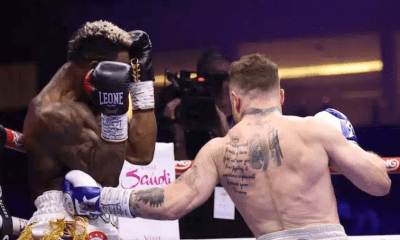
 Featured Articles4 weeks ago
Featured Articles4 weeks agoCanelo Alvarez Upends Dancing Machine William Scull in Saudi Arabia
-
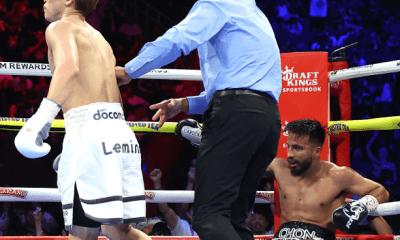
 Featured Articles4 weeks ago
Featured Articles4 weeks agoBombs Away in Las Vegas where Inoue and Espinoza Scored Smashing Triumphs
-
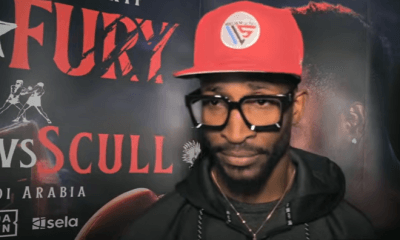
 Featured Articles4 weeks ago
Featured Articles4 weeks agoArne’s Almanac: The Good, the Bad, and the (Mostly) Ugly; a Weekend Boxing Recap and More
-

 Featured Articles3 weeks ago
Featured Articles3 weeks ago“Breadman” Edwards: An Unlikely Boxing Coach with a Panoramic View of the Sport

